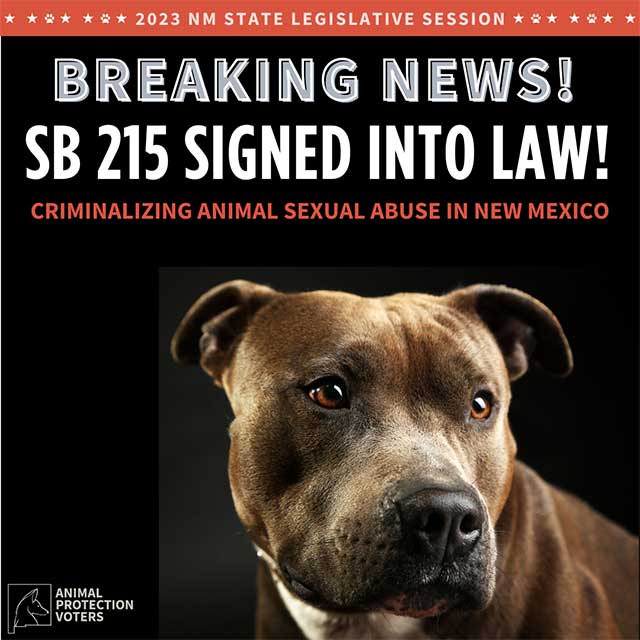
It’s hard to believe, but it’s true. Animal sexual abuse (also known as ‘bestiality’) was not a crime in New Mexico—until Senate Bill 215 changed that in 2023.

On March 30, 2023, Governor Michelle Lujan Grisham signed Senate Bill 215, unanimously approved by the New Mexico Legislature, into law—which means effective June 16, 2023, bestiality finally became illegal in New Mexico. We are grateful to all of the policymakers, leaders, and advocates who were a part of this campaign to make bestiality a serious crime. With the signing of SB 215, West Virginia remains the only US state in which bestiality remains legal.
Animal Protection Voters was proud to lead the charge to pass SB 215 after concerned New Mexicans alerted us to multiple recent alarming internet ads seeking animals to sexually abuse, which referenced specifically that New Mexico lacked anti-bestiality laws. It was indisputable proof that bestiality has continued to occur and proliferate in New Mexico and far past time to put an end to it. SB 215 will not only protect animals from sexual abuse, but also close a gap in law enforcement that has risked letting sexual abusers of both animals and children off the hook.
What is bestiality?
Animal sexual abuse is any sexual act that occurs between a person and an animal. People often assume that the incidence of bestiality is exceedingly rare; however, it occurs throughout the United States, including New Mexico. Incidents frequently go undetected or unreported.
Bestiality has been linked to other sex offenses and deviant behavior through various studies. A recent study produced some staggering statistics:
2 out of 3 animal sexual abusers have also committed child sexual abuse or child pornography crimes.
Over half of animal sexual abusers have committed sexual abuse (of animals or children) and domestic violence.
How will criminalizing bestiality help protect children and others?
Outlawing bestiality in New Mexico—being able to investigate, prosecute and provide serious consequences for this crime—will provide a tool for health professionals, law enforcement, and the courts to address this and prevent other behavior that harms society.
Before the passage of SB 215, there were no statutes in New Mexico law to prohibit the sexual abuse of an animal by a person. For that reason, offenders were charged with crimes that ignored the sexual nature of the offense, such as animal cruelty, disorderly conduct, or trespass—or they faced no consequences at all.
Because New Mexico’s state and local animal cruelty laws often rely primarily on demonstrable injury or neglect, many instances of bestiality—which may leave no visual signs of physical injury or only internal injuries—did not lead to cruelty charges.
New Mexico now joins 48 other U.S. states that outlaw bestiality in some form, and bestiality is also a crime under the federal United States Armed Forces Code.
What does SB 215 do?
Establishes the crime of bestiality (sexual contact between a human and animal)—a 4th degree felony.
Establishes the crime of promoting bestiality, which includes coercing, manipulating, or soliciting another person to commit bestiality; and selling, offering or advertising, buying, or possessing an animal intended to be used in bestiality—a 4th degree felony.
Establishes the crime of aggravated bestiality, which includes committing bestiality or promoting bestiality in the presence of a child or with a child as a participant—a 3rd degree felony.
Those convicted of these crimes: cannot live or work with/for animals for three to fifteen years, and may be ordered to submit to psychological assessment and counseling or pay restitution for care of animals harmed by their crime.
This is more than animal cruelty.
The premier subject matter expert in the U.S., M. Jenny Edwards, BS, MBA, criminologist, Member of the American Psychology-Law Society and the American Psychological Association, Human–Animal Interaction Division) has previously stated: “Bestiality is not “just” an act of animal cruelty; it is an act of sexual assault and coercion. Bestiality offenders behave much like pedophiles or rapists. They train their animals to accept or give penetration and other forms of sexual contact, photograph them in sexual situations, collect and share animal pornography, talk about their encounters with other animal sex abusers in private chat rooms, and frequently work in and around animal-related organizations such as veterinary clinics, animal shelters, and barns. Predators seek out their victims and trespass or break into properties in order to gain access to their sexual targets. These encounters frequently result in injury or death to the animal.”
Recent Examples
In October 2020, Animal Protection New Mexico’s Animal Cruelty Helpline received a report from a concerned individual who spotted an alarming Craigslist ad. This individual had contacted the author to learn more and received an admission of intent to sexually abuse a horse.
A September 2022 anonymous tip to a local news organization shared an ad on an online dating site, alluding to a request for a connection to a dog to sexually abuse (showing an outdated map of the last 5 states without anti-bestiality laws). The ad mentioned: “Legal here [New Mexico] but not many other places.”



